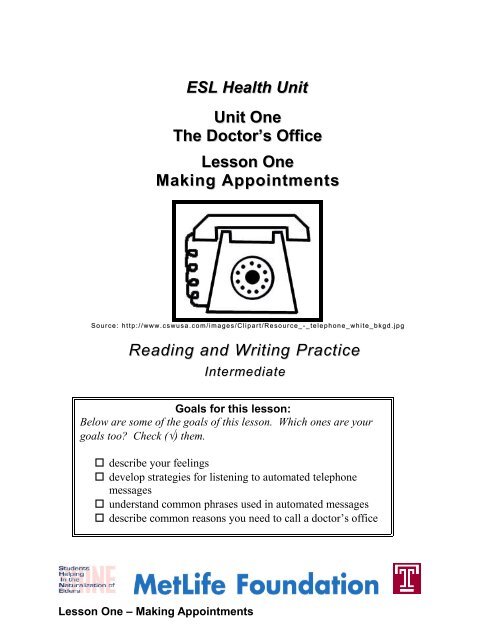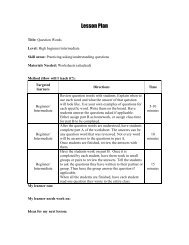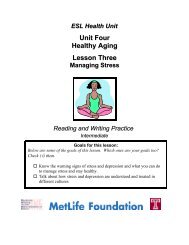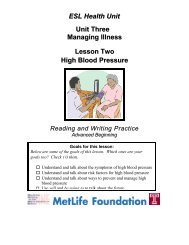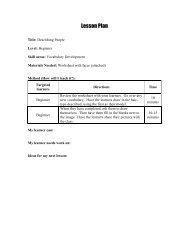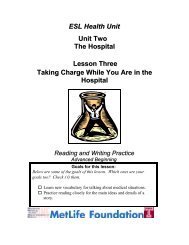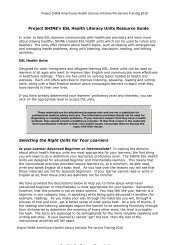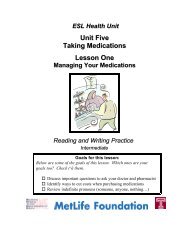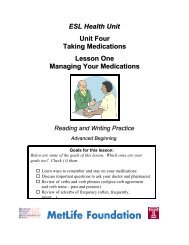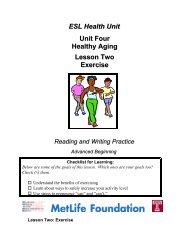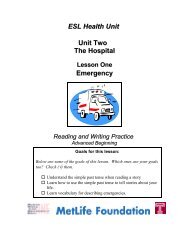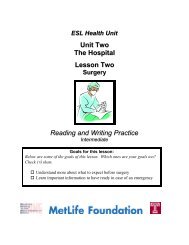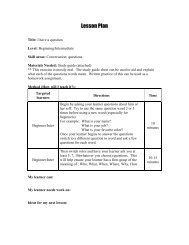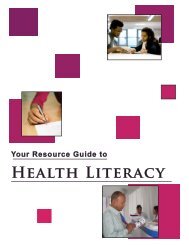ESL Health Unit - Project SHINE
ESL Health Unit - Project SHINE
ESL Health Unit - Project SHINE
Create successful ePaper yourself
Turn your PDF publications into a flip-book with our unique Google optimized e-Paper software.
<strong>ESL</strong> <strong>Health</strong> <strong>Unit</strong><br />
<strong>Unit</strong> One<br />
The Doctor’s Office<br />
Lesson One<br />
Making Appointments<br />
Source: http://ww w. cswu sa.com/image s/Cl i pa r t/Re sou r ce_ - _ te le ph on e_ wh i te_b kgd .jp g<br />
Reading and Writing Practice<br />
Intermediate<br />
Goals for this lesson:<br />
Below are some of the goals of this lesson. Which ones are your<br />
goals too? Check (√) them.<br />
describe your feelings<br />
develop strategies for listening to automated telephone<br />
messages<br />
understand common phrases used in automated messages<br />
describe common reasons you need to call a doctor’s office<br />
Lesson One – Making Appointments
Reading and Writing Practice<br />
Before You Read!<br />
In this lesson, you will read about the frustrating experience one Chinese elder<br />
had when he tried to make an appointment with his doctor. Before you read,<br />
discuss the following questions with your classmates and your teacher.<br />
1. In your home country where you were born, how do you make an<br />
appointment with your doctor? If you call the doctor, who answers the<br />
phone – a person or a machine?<br />
2. Is making an appointment with a doctor in your home country easy or<br />
difficult? Why do you think so?<br />
3. In the <strong>Unit</strong>ed States, how do you make an appointment with your<br />
doctor? When you call the doctor, who answers the phone – a person<br />
or a machine?<br />
4. How does it make you feel when you call somewhere and a machine<br />
answers the telephone?<br />
5. Is making an appointment with a doctor in the <strong>Unit</strong>ed States easy or<br />
difficult? Why do you think so?<br />
<strong>ESL</strong> <strong>Health</strong> <strong>Unit</strong>/Intermediate, <strong>Unit</strong> One: The Doctor’s Office 2
Reading One: Making a Doctor’s Appointment<br />
Now you are going to read a story about the experience one Chinese elder had<br />
when he tried to make an appointment with his doctor in San Jose, California.<br />
Please read the story and then answer the questions with your classmates and your<br />
teacher.<br />
“I tried to call the doctor to make an appointment but it is all automated.<br />
Nobody is there. On the phone I hear, “if you want….press 1…press 2.” I<br />
do not understand and get frustrated. I don’t understand. I’m sorry. I<br />
should go back to my country. It is very difficult to live here even with the<br />
amount of English I understand. What about those who do not understand<br />
at all?”<br />
Questions:<br />
<strong>ESL</strong> <strong>Health</strong> <strong>Unit</strong>/Intermediate, <strong>Unit</strong> One: The Doctor’s Office 3
1. What happened to the man when he tried to call the doctor to make an<br />
appointment?<br />
2. How does the man feel about this experience?<br />
3. Have you had a similar experience? Circle the words that describe<br />
how you feel when you have this kind of experience and then tell your<br />
story to your classmates and your instructor.<br />
frustrated angry comfortable nervous<br />
worried<br />
indifferent<br />
<strong>ESL</strong> <strong>Health</strong> <strong>Unit</strong>/Intermediate, <strong>Unit</strong> One: The Doctor’s Office 4
Culture Box: Voicemail Tips<br />
According to Paul Wenke from The Kansas City Star, most Americans hate automated<br />
voice-mail systems (September 5, 2004).<br />
But voicemail is supposed to help us — not drive us crazy.<br />
To help us use voicemail systems more effectively, Wenke suggests five voice mail tips:<br />
1. If you feel you are very confused and don’t understand the options press “0.”<br />
Most of the time you can reach an operator who can help you with your question.<br />
2. Once you get a real person, explain exactly what or who you need and ask to be<br />
connected to that office or person.<br />
3. Write out what you want before you call. Then you are ready if you get a<br />
recording that asks you to leave a message. Your message should be short and<br />
clear.<br />
4. If you leave a message on an answering machine, ask for a callback time, for<br />
example: “If possible I would like to hear from you by today at 4:00.” It might<br />
not work, but it sounds authoritative.<br />
5. If you continue to have problems, keep trying. Hang up and call again until you<br />
feel comfortable that you understand.<br />
Discuss the meanings of the words in bold with your classmates and teacher.<br />
<strong>ESL</strong> <strong>Health</strong> <strong>Unit</strong>/Intermediate, <strong>Unit</strong> One: The Doctor’s Office 5
<strong>ESL</strong> <strong>Health</strong> <strong>Unit</strong><br />
<strong>Unit</strong> One<br />
The Doctor’s Office<br />
Lesson One<br />
Making Appointments<br />
Source: http://ww w. sym o n e ttes.com/img/ph on e-clip a r t-gif .gif<br />
Listening and Speaking Practice<br />
Intermediate<br />
Goals for this lesson:<br />
Below are some of the goals of this module. Which ones are your<br />
goals too? Check (√) them.<br />
describe your feelings<br />
understand a voicemail message<br />
learn new vocabulary<br />
describe why you call the doctor<br />
make an appointment<br />
Lesson One: Making Appointments<br />
<strong>ESL</strong> <strong>Health</strong> <strong>Unit</strong>/Intermediate, <strong>Unit</strong> One: The Doctor’s Office 6
Listening and Speaking Practice<br />
Before You Listen!<br />
Some of the reasons people call a doctor’s office are listed below. Think about all<br />
of the reasons you have called the doctor’s office since you have been to the<br />
<strong>Unit</strong>ed States and check off any that you have experienced.<br />
□ Schedule an appointment<br />
□ Confirm an appointment<br />
□ Ask the doctor a question<br />
□ Change an appointment<br />
□ Request a referral<br />
□ You feel sick and you need to see a<br />
doctor<br />
□ Ask a question about a bill<br />
□ Request a prescription refill<br />
□ Ask the nurse practitioner a question<br />
□ Talk about an emergency<br />
Have you called your doctor for any other reasons? List them below:<br />
<strong>ESL</strong> <strong>Health</strong> <strong>Unit</strong>/Intermediate, <strong>Unit</strong> One: The Doctor’s Office 7
Listening One – Understanding an Automated Voice Message<br />
**Note to teacher: Do not pass out the written message in the box below until students are<br />
ready for the “Talk About It!” activity. Record it onto a cassette and have students listen to the<br />
recording (If you have time, it may be helpful to ask a friend or family member to record this<br />
<strong>ESL</strong> <strong>Health</strong> <strong>Unit</strong>/Intermediate, <strong>Unit</strong> One: The Doctor’s Office 8
message so that your learner(s) can practice listening to an unfamiliar voice). Play once or<br />
twice before they begin to listen for specific information.<br />
Listen to the following automated voicemail message from a doctor’s office.<br />
Hello. You have reached the <strong>Health</strong> Center Plus. Please choose from the following<br />
options. Listen carefully. Our menu options have changed. If you are a physician or<br />
this is an emergency, press 1. If you want to schedule, change or confirm an<br />
appointment select 2. If you want to refill a prescription press 3. If you want to<br />
request a referral or if you have a question regarding your referral press 4. If you<br />
wish to speak to the secretary of Doctors Smith, Green, or Nguyen, press 5. If you<br />
are sick and you wish to speak to the nurse practitioner select 6. If you have a<br />
question about a bill press 7. If you are calling from a rotary phone please stay on<br />
the line for the next available representative.<br />
Now listen again and write the phone number the caller should select for each problem.<br />
<strong>ESL</strong> <strong>Health</strong> <strong>Unit</strong>/Intermediate, <strong>Unit</strong> One: The Doctor’s Office 9
___ Schedule an appointment<br />
___ Confirm an appointment<br />
___ Ask the doctor a question<br />
___ Change an appointment<br />
___ Request a referral<br />
___ You feel sick and might need to see a doctor<br />
___ Ask a question about a bill<br />
___ Request a prescription refill<br />
___ Ask the nurse practitioner a question<br />
___ Talk about an emergency<br />
After you have written a number beside each problem, share your answers with your<br />
classmates and your teacher.<br />
Talk About it!<br />
Making Polite Requests:<br />
<strong>ESL</strong> <strong>Health</strong> <strong>Unit</strong>/Intermediate, <strong>Unit</strong> One: The Doctor’s Office<br />
10
One way of making a polite request is to phrase it as a question with could or<br />
would while using polite language:<br />
Wait here.<br />
→Would (could) you wait here, please?<br />
Sit down.<br />
Drive me home.<br />
→Would you like to sit down?<br />
→Could you drive me home, please?<br />
In general, would like is more polite than want.<br />
Another useful phrase: would you mind + the –ing form of the verb.<br />
Would you mind holding the phone?<br />
Now you try it: Rephrase the following into polite requests:<br />
1. Ask someone if that person desires a cup of coffee.<br />
<strong>ESL</strong> <strong>Health</strong> <strong>Unit</strong>/Intermediate, <strong>Unit</strong> One: The Doctor’s Office 11
2. Rephrase Help me out as a polite request.<br />
3. Rephrase more politely: Wait a few minutes. (Two possibilities.)<br />
4. Rephrase more politely: Fill out this form.<br />
5. Rephrase more politely: Help me onto the table. (Use mind.)<br />
6. Rephrase more politely: Write down the instructions.<br />
7. Rephrase more politely: Call my son.<br />
8. Rephrase more politely: Do me a favor.<br />
9. Rephrase more politely: Make an appointment for me for next week.<br />
Activity One:<br />
Compare the different speakers in a doctor’s office. Which speakers use polite<br />
language? Underline language you think is polite.<br />
<strong>ESL</strong> <strong>Health</strong> <strong>Unit</strong>/Intermediate, <strong>Unit</strong> One: The Doctor’s Office 12
Receptionist:<br />
Maria:<br />
Dr. Lopez’s office. How may I help you?<br />
Hi. I need more medicine.<br />
Misha:<br />
Secretary:<br />
I would like to schedule an appointment please.<br />
When would you like to come in?<br />
Nurse Practitioner: Hello, this is Judy Smith.<br />
Jana:<br />
I am sick and want to see a doctor.<br />
Nurse Practitioner: Ok, could you tell me what’s wrong?<br />
Jana:<br />
I feel terribly dizzy when I stand up.<br />
Nurse Practitioner: Ok, let me help you schedule something. Could you come in<br />
tomorrow?<br />
Roberto:<br />
Secretary:<br />
Roberto:<br />
Hi, I have a big problem with a bill.<br />
Could you tell me the invoice number or date of service?<br />
It’s for May 5. You charged me for laboratory fees but I wasn’t in a<br />
laboratory. Fix it please.<br />
Now…correct the speakers who do not use polite language. Now practice each corrected<br />
dialogue with a partner.<br />
Activity Two:<br />
*NOTE: Copy these roles onto index cards (or cut these roles apart) and give<br />
learners cards with different roles so that they cannot see each other’s character.<br />
<strong>ESL</strong> <strong>Health</strong> <strong>Unit</strong>/Intermediate, <strong>Unit</strong> One: The Doctor’s Office 13
With a partner, practice using automated answering messages. First, read the<br />
roles below. Then prepare an appropriate message for each role. Next, one<br />
partner should be the automated message by reading the text your teacher gives<br />
you. The other person should call, press the appropriate number and then leave a<br />
voicemail message. Refer to the Culture Boxes “Voicemail Tips” and “How to<br />
Make Polite Suggestions” for ideas.<br />
1<br />
Carlos: You saw Dr. Green a month ago for pain in your back and yesterday<br />
you received a bill in the mail. The bill says that you should pay for<br />
laboratory blood tests but you did not have any laboratory work done. Call<br />
the office and ask them to fix your bill.<br />
Anna: You have heard people talking about flu shots. Because you are 70<br />
years old, you fall into the high risk category for the flu and would like a flu<br />
shot. Call your doctor’s office and ask how you make an appointment to<br />
receive a flu shot.<br />
1<br />
<strong>ESL</strong> <strong>Health</strong> <strong>Unit</strong>/Intermediate, <strong>Unit</strong> One: The Doctor’s Office 14
Ping: You have been suffering from a bad cough and shortness of breath for<br />
about two weeks. Call your doctor’s office and make an appointment to see<br />
someone.<br />
Alexander: Your prescription for Micronase (diabetes medicine) has<br />
expired and you need more. Call to ask for a prescription refill.<br />
<strong>ESL</strong> <strong>Health</strong> <strong>Unit</strong>/Intermediate, <strong>Unit</strong> One: The Doctor’s Office 15
<strong>ESL</strong> <strong>Health</strong> <strong>Unit</strong><br />
<strong>Unit</strong> One<br />
The Doctor’s Office<br />
Lesson One<br />
Making Appointments<br />
Source: http://ww w. teleph on ea r t.com/clipa r t/tele ph on e1 12 3 .gif<br />
Real Practice<br />
Intermediate<br />
Goals for this lesson:<br />
Below are some of the goals of this lesson. Which ones are your<br />
goals too? Check (√) them.<br />
describe your feelings<br />
develop strategies for listening to automated telephone<br />
messages<br />
understand common phrases used in automated messages<br />
describe common reasons you need to call a doctor’s office<br />
<strong>ESL</strong> <strong>Health</strong> <strong>Unit</strong>/Intermediate, <strong>Unit</strong> One: The Doctor’s Office 16
Lesson One: Making Appointments<br />
Real Practice!<br />
Call your doctor’s office after hours. Listen to the voicemail message, writing<br />
down all the options. Call the number again until you are sure that you have the<br />
correct information written down.<br />
<strong>ESL</strong> <strong>Health</strong> <strong>Unit</strong>/Intermediate, <strong>Unit</strong> One: The Doctor’s Office 17
Vocabulary Log:<br />
A Thematic <strong>Unit</strong> for Intermediate Level <strong>ESL</strong> Teachers<br />
Intermediate, <strong>Unit</strong> One: The Doctor’s Office<br />
Lesson One: Making Appointments<br />
Checklist for Learning<br />
In the space below, write down all of the new words you learned during this lesson<br />
that you want to remember. Try to separate your list of words into nouns (person,<br />
place or thing), adjectives (describing words) and verbs (action words). For extra<br />
practice use them in sentences of your own.<br />
New words I learned during this lesson:<br />
Nouns:<br />
Adjectives:<br />
Verbs:<br />
What can you do?<br />
Below are some of the language goals you worked on during this lesson. Check (√)<br />
what you learned from this lesson. Add more ideas if you wish.<br />
I learned to…<br />
describe your feelings<br />
understand a voicemail message<br />
learn new vocabulary<br />
describe why you call the doctor<br />
make an appointment<br />
________________________________________________________<br />
<strong>ESL</strong> <strong>Health</strong> <strong>Unit</strong>/Intermediate, <strong>Unit</strong> One: The Doctor’s Office 18


